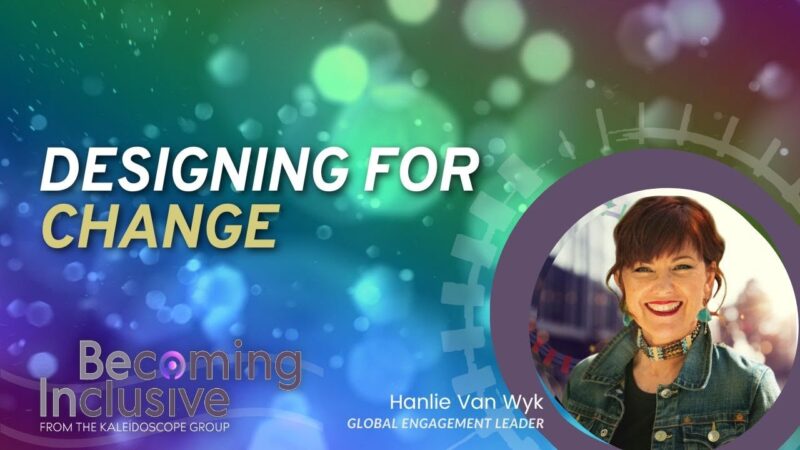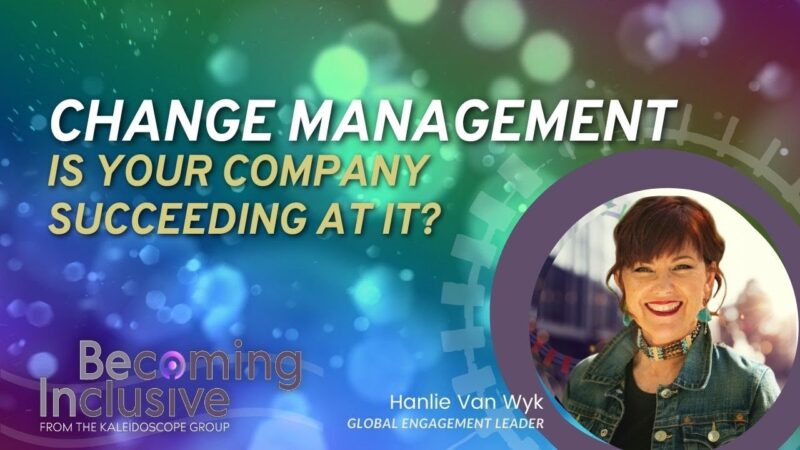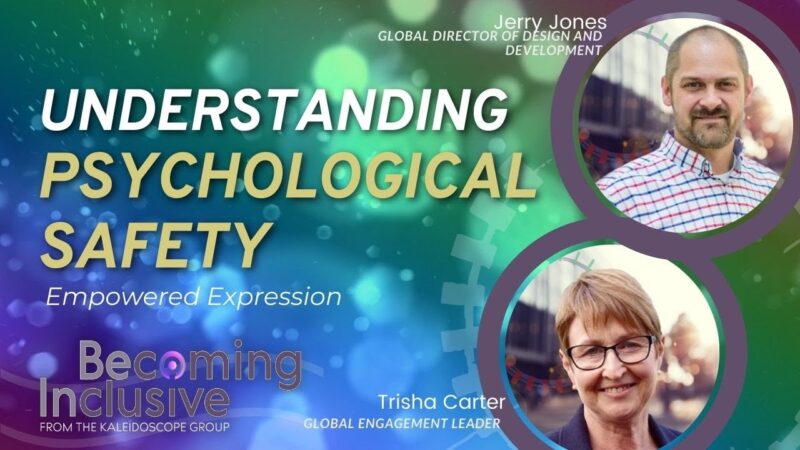Why Equity Isn’t Enough
December 27, 2021
Audio Format
Would you rather to read through what’s said?
This is Becoming Inclusive from The Kaleidoscope Group, where we’re thinking differently about diversity, equity, and inclusion. For more empowered people at work. We’re committed to real change and that begins with real conversations. Welcome in.
This conversation has been lightly edited for clarity.
Reggie Ponder
Welcome to another episode of Becoming Inclusive. Today joining me is Mitch Brown, Senior Consultant for The Kaleidoscope Group.
Mitch Brown
Hey, good to be here!
Reggie Ponder
We had our first discussion about why diversity is not enough with Chris Georgas, the COO of The Kaleidoscope Group and she talked about why diversity wasn’t enough. Our second episode, we had an opportunity to talk to Margarita De Leon, the Vice President of Client Services, and she talked about why inclusion is not enough. Now I get to talk to you about why equity is not enough. Before we talk about why it’s not enough, let’s get into what equity really is. I always like your perspective on this, Mitch. What do you think equity looks like?
Mitch Brown
In summation, equity is efforts that an organization or a person takes to create fairness and opportunities for others where equity exists.
Reggie Ponder
You came all academic on me and everything. So, break that down to me, how would that look in an organization? Give me an example of that.
Mitch Brown
A lot of times, organizations, or clients that I work with want to be more equitable. That’s something we’re hearing a lot of nowadays. In their efforts to be more equitable, organizations must look throughout their organization and enterprise and look at ways that they are inequitable.
You can go and look at your outcome. You can look at data, look at certain trends. And if there is an equitable representation across the diversity of your organization, that’s something you may want to investigate. For example, in terms of benefits, what a lot of organizations are doing is pay equity and compensation. You can think about the distribution of your stakeholders in your organization, and what that means in terms of identity by some of the diverse demographics. Like racial makeup, gender makeup, generational makeup. Seeing you identify what populations among your stakeholders may be experiencing, some skewed outcome or inequity that they’re dealing with. So if I have an issue with hiring and representation, for example, equity might be going and looking at hiring practices.
Reggie Ponder
When I think about equity, I always think about the famous picture where you have these young three kids standing on a box, that’s the same. And the smaller kid is standing on the same box that the taller kid is standing on, but can’t see over the fence, the middle kid, barely can see over the fence, but the taller kid really didn’t need the box. And it’s really an accurate example of what equity means.
Mitch Brown
When I talk about understanding inequities, you must understand that people in the world that they live in, in the way that they exist. It’s not set up for me just like it is set up for everybody else. People experience different realities. One of the things to take into consideration regarding equity is taking that different reality, and seeing how we can address some of those variances, or discrepancies. Again, some of those things are no one’s fault. Sometimes they may be someone’s direct fault, but what are we doing as an organization to help? If you think about that picture, what they’re all trying to do is be able to view the game. Each has differing circumstances impacting that. That’s what that illustration is about. That’s a little bit about what equity is about.
Reggie Ponder
We can understand that in the sense of being tall and short. But it becomes a little murky for people when we start talking about things like gender. So why how do I have to give a different box or two boxes? For someone from a gender perspective? Can you bring that into focus for us?
Mitch Brown
If you Google, you will get several hits when it comes to gender. Pay Equity is probably one of the most notable topics in the equity space when it comes to gender dynamics. For years, across many different industries, and many different companies, people have been doing some of the similar work or same work or in the same roles, functions, titles even, but there’s a huge discrepancy between what they take home compared to their male counterparts. So therein lies, one of the not as easy issues to deal with.
Reggie Ponder
You say it’s not an easy issue. I want to push back on that. For me, the issue of pay equity is an easy issue. Somebody who does the same amount of work has the same title, gets paid more. I don’t understand why that’s not solved. I don’t understand what is difficult about that because that is clear-cut.
Mitch Brown
The concept is definitely very easy. And it’s something that’s easily agreeable if you’re in the inclusion space. The barrier is that most organizations and companies have their roles and responsibilities and duties, and pay bands are set up in such comprehensive and complicated ways. It’s hard sometimes to make an argument about what’s an orange to orange. That’s where you often see pushback. What’s acceptable to most people, in terms of the pace of wishes, gets complicated, it’s because of those kinds of things. So that’s what I mean when I say it’s not easy because you’re working on navigating through those things. Pay equity, take an example from the United States. Women’s soccer, national saying, “equal pay for equal play,” those things is something that everybody can rally behind and get behind. There is a quintessential example of why equity is needed, and why it’s important.
Reggie Ponder
One of the things about equity is that it seems to me that equity is about recognizing that there are barriers and, or, and or recognizing that there might be privileged in some different areas. And privilege is a whole different discussion. But I don’t think we can have the equity discussion without at least touching on privilege a bit. I’d like to get your thoughts on that.
Mitch Brown
I think you’re right about that. I think we talk about privilege, as the existence of or at the absence of barriers and the existence of unknown positive advantages. And what we simply mean by the way people’s lives are set up varies. Privilege isn’t something that necessarily has to mean what you think it means, right? You can be privileged in many ways. You understand where you are why I’m best situated to create fairness and equity for others based upon again, my position of Power Privilege, so on. So, there’s that connection, right, fairness, opportunity, and creating that.
Mitch Brown
Here is a negative anecdotal example, let’s take like women’s suffrage or the right to vote. If you look back along at that piece of history, you think about who is in congress or in legislation with the ability to give women the right to vote? Well, there weren’t any women in Congress, so that legislation took men who were in a position of privilege and power to create fairness and opportunities for others by passing that legislation. That’s more of a grand kind of effort. But that’s where the opportunity lies. A lot of what we can do and how we show up every day is by understanding what part we can play.
Reggie Ponder
I love that I think that that’s a great, great anecdote. So now, we got equity. We’ve defined it. So why is equity not enough?
Mitch Brown
That’s tricky. I originally thought that it was a trick question when I was preparing for this podcast. Because I thought equity was enough. I thought equity was one of the primary things that people should be worried about in our business. But then I thought more deeply about it. And I thought that it’s not enough. It’s not enough because it’s not enough in its isolation. So, you’ve already talked to Chris Georgas about diversity, you’ve talked to Margarita about inclusion, and what’s next? And not to give any kind of preview to the audience, but we may talk a little bit about this idea of unity. And unity is about the idea that it’s not going to take some of us, but it’s going to take us all. And when it takes us all, equity is one of those things where if you’re creating fairness and opportunities for others, by definition, sometimes you’re doing things that are going against the grain, or you’re going against the status quo, if you will, you’re doing things differently in a way. And some people, or some entities, will resist that and will feel some type of way about the change. So, the unity piece is something that makes that bet full circle, right? It helps people understand that equity is not about necessarily leaving others out. But really calling people in. I think the unity play is that big piece. So that’s why to me, equity is not enough. You need these other components of diversity, equity, and inclusion.
Reggie Ponder
I really do understand when you talk about needing diversity and needing inclusion too. Mitch, I believe that when the industry of diversity began, so to speak, that it was all about equity. But that was the foundation of what diversity was talking about. Equity was undergirded. And I’d love to get your thoughts on that.
Mitch Brown
I think historically when you look at American history of inclusion there has been a narrative built around first, I think gender, and then it moves in the civil rights movement to be much more about race, and subsequently, maybe more about, you know, LGBTQ+ rights, and so on. So, I think what you’ve had, and what you’ve seen is that because of the inequitable circumstances, in some cases are so egregious, that what we’ve had to do is, you know, like my example earlier, is legislate inclusion. Right? And that is a lot of times how equity plays come to pass. So, in many ways, agree with you, Reggie. You know, somebody looks at something like affirmative action, right? That’s not a new concept, right? It’s a very old concept. And one that I think is misinterpreted or misconstrued is that people think that Affirmative Action was just about people of color when it’s really just about underrepresented entities within the workplace, which at the time was not only really about people of color, but also a lot about women and things like that as well. Subsequently, things like Title Nine came along and those kinds of things. So I think that yeah because circumstances are so egregious, we have to start with equity. And we kind of you know, again ramped up the diversity amongst pretty much you know, the corporate workplace, the educational, academic, workplace, so we have to value and leverage different because you know what, we got an organization or we got a school just this looks totally different than it did traditionally. And inclusion and diversity became more of a, I guess, a forward-thinking kind of thing rather than equity. Equity doesn’t necessarily have to be something that is perpetual, so to speak, right, good equity plays, maybe addressing situations that allow you to create that fairness and opportunities for others. And once you have it, right, what do you do from there? So I think, again, your comment around hey, that seems like where we started, right? And I think it’s still needed for that as we go along. Because some issues that we’ve had never get addressed, or they never get resolved in a way that’s, you know, satisfactory, and maybe in some ways to some individuals. But that’s a good point to kind of point out in just a couple of thoughts.
Reggie Ponder
Mitch, do you believe that you can have equity without diversity and inclusion?
Mitch Brown
I think you can, but I don’t know if you would be very successful, or have operational excellence. Because a lot of times equity without great support and communication, again, in terms of the receptivity of how people think about what’s happening is unique. Let’s stick with the common example, we’ve been using prior, you know about representation, right? And if an organization says, You know what, my organization isn’t particularly diverse, and that’s problematic, because of the marketplace that we serve, the communities in which we operate, we want to be more representative of both the people we sell sprockets to and the, you know, places where we build our manufacturing plants to make these sprockets. So yes, we want to make an effort to do something about that. So okay, that’s still on the table, right? So your equity play might be, what we’re gonna go and make sure we have, you know, what they call in the NFL, the Rooney Rule. So that’s really just a diverse slate of candidates, right? So if we don’t have two or three diverse candidates, we won’t move on a “job”. What else might we do? We might make sure that we diversify our interviewing panels, right? We might make sure we look at our discussion, guides, and make sure that there’s no culturally biased wording, terminologies, those things like that. So you do all these things, right? And then you get the new hires. And guess what, by golly, you started to get some more diverse representation. So that was a whole description of equity play. Now. So your question, if you don’t have inclusion, as a part of that, and inclusion, is more about as a people leader or people manager or somebody who’s in talent acquisition, how do you support that hire. Because you just can’t leave it at, hey, we did the equity play, another person’s here. Because now you have to deal with this idea of what some people might have a preconceived notion, oh, this person was just hired because what: they’re different, right. And then if you do that, you might sabotage that person’s experience, you do that then when we talk about unity, you already created another wedge, which doesn’t allow for the camaraderie, the team collaboration. So inclusion in this example of good inclusive behavior of skillful people leader is supporting around communicating around the hire, hey, this person met all the qualifications and needs that we have for this job. But this person also adds something to our team that we haven’t had. And that’s why this person is of value. So that’s a very much a conversation that saying, oh, you know, I hired Miss Brown because we got this diversity thing going on. And yeah, we’re super equitable. But we’re probably not a happy place to work.
Reggie Ponder
Is there’s an additional point that you might want to make as to why equity is not enough?
Mitch Brown
Again, I just think equity is one of those things that is very important. However, equity has to be supported and complemented by efforts around inclusive behavioral skills. And that’s saying how you communicate with others, how you lead others, how you give people cultural competence skills to really have, what I call, operational excellence. Equity could definitely give you the results you want, but you can’t think about them in a vacuum you have to consistently be thinking about who you are, curating a culture that has significant biodiversity. And you got to always know that and understand that all stakeholders have different emotions, different feelings, different things. And if you’re leading the organization or you’re a leader, or you’re out there and you’re leading this work, it’s important that you be all things as much as you can, in terms of unifying all of those different stakeholders and stuff like that. So that’s why equity is not enough because, again, what we’re looking to accomplish true Unity.
Reggie Ponder
Mitch, again, thank you as usual. I’m Reggie Ponder and this is Becoming Inclusive. Thanks for joining us, and a special thanks to our subscribers. Consider becoming one today. Becoming Inclusive is presented by The Kaleidoscope Group, your full-service Diversity, Equity, and Inclusion partner serving clients worldwide. Learn more and continue the conversation and kgdiversity.com


